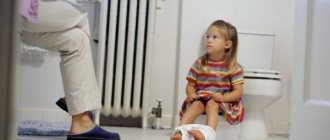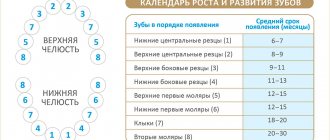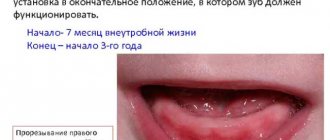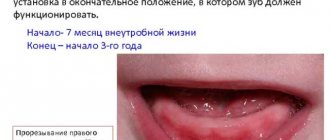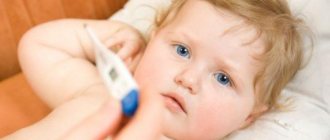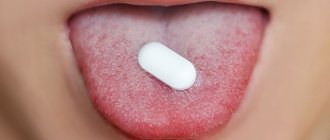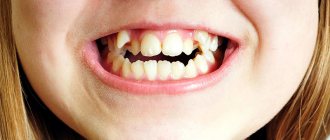The formation of baby teeth is a stressful situation for a baby, to which his body usually reacts with an increase in body temperature. Of course, this happens not only because of teething. It will be useful for many parents to know what to do when their baby suddenly has a fever.
What causes body temperature to rise during the formation of baby teeth?
There is a misconception that a child’s elevated body temperature during the eruption of baby teeth is not normal and therefore measures should be taken to lower it to a normal level. In fact, this is not so. The fact is that at the site of tooth eruption, the body’s immune defense decreases. Harmful bacteria enter the disturbed gum and cause an inflammatory process, which is always accompanied by an increase in body temperature. It should be understood that elevated temperatures have a detrimental effect on harmful microorganisms. Of course, this does not mean that excessively high temperatures during teething are normal.
Parents of the baby should not worry if, during the formation of baby teeth, the baby’s body temperature does not exceed 38 degrees.
In one-year-old babies, the process of tooth formation is much more complicated. It is after the first year of life that a child’s canines and molars begin to form. These teeth erupt much more slowly and, accordingly, increased body temperature can persist for a long time. Their long formation is explained by the uneven shape of the molars and their size. Sometimes it lasts several weeks.
The same situation occurs during the eruption of eye teeth. Their roots are located much deeper than the rest of the baby's teeth. Therefore, the growing eye tooth has to travel a longer path to the gum surface. All this time, the child experiences discomfort, and his body responds to it with an increase in body temperature.
In essence, the emerging baby teeth tear the soft tissue of the gums, and this cannot be painless. In this place, the immune defense is weakened due to injury. During the formation of molars, children often develop a fever. This happens when the impact of harmful microorganisms becomes too powerful, that is, an infectious infection has occurred. In this case, the body temperature rises to 38 degrees, and sometimes above.
What is the maximum permissible body temperature of a child during the formation of teeth?
How high a baby's body temperature can rise depends on the condition of his body. During teething, a normal body temperature is considered to be between 37.5 and 37.7 degrees. The maximum permissible temperature is 38 degrees. If it increases further, then measures should be taken to reduce it.
Parents should remember that during the period of formation of baby teeth, the child’s body temperature should be measured more often.
If the child’s body temperature reaches 39 - 40 degrees, this means that urgent medical attention is needed, since, most likely, the infection has penetrated the baby’s respiratory system.
When to lower the temperature
There is no need to lower the temperature to 38.5°C. If it rises higher, you need to take action. Hyperthermia affects many processes in the human body. During fever, the water-salt balance is disrupted and the load on the heart increases. In severe cases, convulsions may occur that can lead to respiratory arrest. In no case should this be allowed to happen, as this would pose a threat not only to the health, but also to the life of the little patient.
- How many days does a baby's teething temperature last?
When to give antipyretic drugs:
- temperature exceeded 39°C;
- breathing rate increases;
- the baby sleeps for a very long time;
- the child is restless, cries, cannot calm down;
- drying of mucous membranes, redness of the skin;
- the occurrence of convulsions (in this case, they give an antipyretic and immediately call an ambulance).
If the child has already had convulsions once, the temperature must be brought down when it exceeds 38°C.
How long can an elevated body temperature remain?
There is no clear answer to this question. It all depends on the health of the baby. As for the results of long-term observations, on average, the increased body temperature of a child during the formation of baby teeth persists for one to three days. It is important to note that when the top of the tooth appears above the surface of the gum, body temperature returns to normal. This happens as each tooth erupts.
However, statistics show that in some children, elevated body temperature persists for four or even five days, and the fever can last only a few hours and go away on its own.
Knowing all of the above does not mean that parents should not show their baby to pediatricians. An extra examination by a specialist will never hurt, but, on the contrary, will help identify diseases at the earliest stage of their development.
How to properly lower the temperature at home?
Effective folk ways to reduce fever without medications in children:
- A drink made from cranberries is a unique diaphoretic that reduces fever. The berry is useful for containing vitamins and accelerates the elimination of decay products.
- Chamomile tea is an excellent anti-inflammatory remedy. To prepare the infusion, pour a tablespoon of chamomile into a glass of boiling water, let it brew for 2 hours, drink up to 5 times a day.
- Elderberry decoction effectively helps reduce fever. It is enough to take 50 g of elderberry and pour boiling water (200 ml) over it.
- Linden tea – gives excellent results when consumed with honey. The child will sweat profusely, which will reduce body temperature due to the evaporation of excess moisture from the skin.
You can wipe the child's body with a terry towel moistened with water at room temperature. Applying a heating pad with ice to large vessels helps. Wrapping in a damp towel or sheet is also recommended.
What symptoms can accompany high temperature?
During the period of teething, in addition to elevated temperature, the child may exhibit other symptoms. Often at this time, swelling of the gums occurs, which can reach the mucous membrane of the nose. This phenomenon is accompanied by a runny nose and copious discharge of clear fluid from the nose. Swelling most often occurs when the baby's upper teeth erupt.
If the elevated body temperature persists for five days, then you should immediately call a doctor.
You should also know that during teething, babies produce copious amounts of saliva. It is especially pronounced when the lower teeth erupt.
Anxiety, digestive and sleep disorders
At 6-8 months of life, children begin to erupt milk teeth. Swollen gums cause discomfort, causing the child to put everything in his mouth, trying to relieve the itching. For most children, the process of the appearance of their first teeth is hectic, which manifests itself:
- sleep disturbance;
- sore gums and refusal to eat;
- runny nose and excessive salivation;
- possible disruption of bowel function;
- and, most unpleasantly, temperature during teething.
Of course, not all children experience the above symptoms. For some, the process of formation of the masticatory apparatus goes almost unnoticed. But quite often the child’s body reacts to the appearance of the first incisors, fangs and molars as if it were an inflammation. This can cause a child to develop a fairly high temperature on the teeth, against the background of which other disorders also arise in the small body.
Warning symptoms
During the period of teething, the child’s body is weakened and therefore more susceptible to viral or bacterial diseases. At this time, you need to monitor your baby with maximum attention. You should seek help from a doctor if you have the following symptoms:
- The baby's nose is very stuffy and a purulent substance is released from it. Such signs indicate the likelihood of rhinitis, which can only be cured with medication.
- The appearance of diarrhea does not mean that it is directly related to teething. Most likely, an infection entered the child's stomach through toys or a gum teether. The baby should be shown to a doctor.
- During teething, the baby's mouth produces copious amounts of saliva. The child does not always have time to swallow it, and this causes him to cough, or rather, cough. If the cough becomes prolonged, this means that the baby’s respiratory system has become infected. You can’t do this without the help of a doctor.
- It should also be taken into account that teething cannot cause redness in the throat. If this happens, it means that the child has pharyngitis or a general respiratory disease.
- Vomiting at elevated body temperature during teething is an alarming signal. This happens when the nervous system is damaged or due to an intestinal infection. Calling a doctor in such a situation is mandatory.
All of the above symptoms are alarming, even if they appear without elevated body temperature.
How to help with teething?
Measures of treatment and assistance with teething depend on the age of the patient. If it is a baby, the condition is difficult to tolerate. Many drugs are not available for this group of patients. For adult children, completely different therapy is prescribed. All methods are listed in the table.
| Method of therapy | Young children | Older children or adults |
| Painkillers | Anesthetic gels applied to the gums. For example, Kalgel, Kamistad. They act locally, so the risk of side effects is reduced | Topical gel applied to the gums. If the pain is unbearable, take a non-opioid analgesic. NSAIDs relieve pain, fever, inflammation (Ibuprofen) |
| Herbal decoctions | The method is rarely used; it is impossible to predict allergies. Use chamomile or calendula lotions. They have a disinfecting, anti-inflammatory effect | Rinse your mouth with a decoction of chamomile, calendula, celandine, and oak bark. |
| Rinse with antiseptics | Not applicable | Furacilin, Chlorhexidine. Destroy pathogenic microorganisms in the oral cavity, preventing infection of the socket |
| Doctor's help | Not used, teeth erupt on their own | If eruption is difficult, use a scalpel incision in the gums. The method is used for purulent infection |
If a runny nose, diarrhea, or hyperthermia persists after the tooth appears, look for another cause. Conditions require different treatments. For example, using antibiotics.
Child's body temperature when replacing baby teeth with permanent ones
During the period of loss of baby teeth and the appearance of permanent teeth, the child’s body temperature remains normal. Only some children's body temperature rises when permanent molars begin to form. The reason for this is the size and shape of the molars.
Typically, children's first permanent teeth begin to form at the age of six. If at this time the child’s temperature rises, then there is a possibility of gingivitis. This disease is characterized by inflammation of the mucous membrane of the gums and requires treatment.
How should parents behave when their child’s body temperature rises?
Many parents, having discovered an increase in the child’s body temperature during the period of teeth formation, try to bring it down with antiviral or antipyretic drugs. Meanwhile, there is no need to rush in such a situation.
A body temperature within 37 degrees should not cause anxiety in parents, since this is the norm during teething, and more precisely, a normal protective reaction of the body. In such a situation, you just need to wait until the body itself copes with the pathogenic microorganisms that have penetrated it.
However, if the body temperature exceeds 38 degrees and the baby experiences attacks of fever, it is advisable to use antipyretic drugs. If this does not help, then the baby should be wrapped in a diaper soaked in a weak vinegar-alcohol solution or simply moistened with cool water.
If high temperature and fever attacks occur for three days, then a medical examination of the baby is necessary. He probably developed some kind of disease that had nothing to do with teething. It is allowed to use homeopathy instead of antipyretic drugs. These drugs cannot reduce body temperature, but at the same time significantly improve the general condition of the baby. This in turn contributes to a speedy recovery. However, the use of homeopathic medicines without the approval of a pediatrician is unacceptable.
Will walking during teething be harmful?
If during the period of teething the child’s body temperature does not exceed 37 degrees, and the baby himself does not suffer much from this, then walks will benefit him. In such a situation, the baby should be dressed for the weather and walked with him away from people to avoid possible infection. You should not get involved in active games at this time.
If the baby’s body temperature has risen above 37 degrees, and he himself does not feel well, then it is better to refrain from walking until he recovers.
In conclusion, let us remind you that self-treatment of children is always fraught with bad consequences. Do not hesitate to contact your doctor again.
What can you do to bring down the temperature?
An increase in a child's temperature is always a reason for panic among his parents. But it is important to control yourself and be able to properly help your child. To normalize body temperature, you can resort to methods of traditional and folk medicine.
Medications
For young children, it is best to give the medicine in syrup form or use rectal suppositories. Both the baby and the older child will refuse to take the bitter pill, and giving it to him will be problematic. If you don’t have anything else at hand, then you can try mixing the medicine with something tasty - honey, fruit puree.
Medicines for fever in a child
To normalize a child's body temperature, medications based on paracetamol or ibuprofen are used in pediatrics. The first can be given to a baby from the first days of life, the second - from three months. Before use, you should consult with your doctor, and also study the instructions for the drug in detail, paying special attention to side effects and dosage.
Traditional methods
If you don’t have the required medications in your medicine cabinet at the right time, you can resort to traditional methods of lowering your temperature. They allow you to reduce the heat by 1-2 degrees. This is often enough to stabilize the child’s general condition.
Effective methods:
- Toothache and fever
- Physical cooling with a diaper or sheet. This method can hardly be called purely folk, since it is also used in medical institutions. Its essence is to cool the “burning” human body. It is necessary to wet the diaper in warm water and wrap it around the baby.
- Rubbing with warm water. It is necessary to prepare a sponge and a deep container with water. Her temperature should be 36-37 degrees. Water that is too cold can cause chills and even trigger cramps. Hot water will not bring the expected effect. Take a little warm water into a container, moisten a sponge in it and carefully wipe the child’s feet and hands, elbows and knees, and armpits.
- Cabbage leaves. They need to be kept in boiling water, and then beaten a little, cooled and applied to the baby’s body.
- Linden blossom. It can be given even to children under one year old. It has a pronounced diaphoretic effect. As a result, the child sweats and body temperature decreases. Use after consultation with a specialist and in the absence of an allergic reaction to this plant.
It is best to use traditional methods of treatment in tandem with traditional ones. This will not only achieve the desired effect, but also quickly improve the child’s condition.

